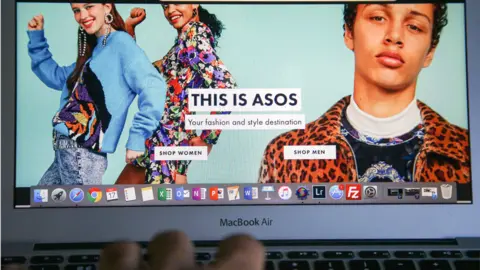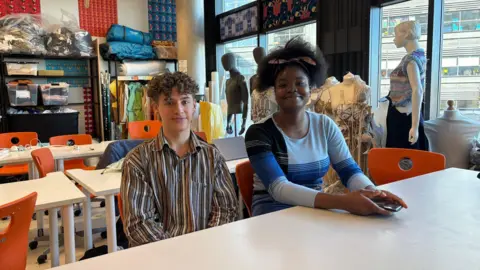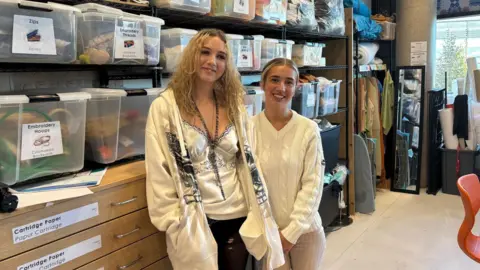
 Getty Images
Getty ImagesA panic order ahead of the weekend and a return on Monday for the stuff we do not want – many of us are used to the convenience online shopping gives us.
But online retailer Asos is the latest of many to introduce a returns fee from Tuesday for frequent returners, blaming the level from some people as “unsustainable”.
Online shopping generates 4.8 times more packaging waste than offline shopping, according to one study, in addition to the emissions from transferring goods to people’s homes.
Medi Parry Williams, a retail marketing expert, said some stores have reported return rates of more than 25%, and that fees may get customers back in physical stores.
The new return rules for Asos mean customers who return “regularly” will now have £3.95 deducted from their refund if they keep less than £40 worth of items.
Those with their premium subscription, which offers next day delivery and costs £9.95 a year, will need to keep £15 worth of an order.
They have not clarified what a “regular” returner means but said for the majority of customers, they will still be able to return for free.
Pretty Little Thing faced a backlash in June when it introduced a similar policy, while H&M did a U-turn on charging customers for online returns in store last year.
Other stores have also adopted similar approaches.
Is online shopping bad for the environment?

Prof Christian Dunn, the sustainability lead at Bangor University, said: “When you click the button that says ‘I want it tomorrow or fast delivery’, that can also increase the carbon emissions because it’s having to potentially be put onto a smaller, quicker vehicle and it will be being flown to you rather than being shipped.
“So simple things like not having next day delivery can help save some of those carbon emissions when you are purchasing online.
“I think anything that stops people purchasing stuff just for the sake of purchasing stuff has to be a good thing.”
However, he added the responsibility is with both the retailers and the shoppers.
Will charging for returns put people off?

Students studying fashion at Cardiff and Vale College are used to thinking about sustainability but said shopping online is a big part of the industry.
Henry Sengpiel, 20, said he would like to know more about what retailers do with the returns and is particularly concerned about “living in a world that’s liveable”.
“If you purchase something knowing it’s going to cost to return you may not throw away your money in that sense and you may think about it a little bit more, putting that inconvenience in that way,” he said.
Debra Hart, said she shops 50/50 online and in store. She said sizing and accessibility may be factors in people making their decisions.
“I think we might need to dig deeper to know where the problem lies,” adding some people just “don’t care”.
She added: “I think when we talk about sustainable fashion, do we really think about ourselves and what effort are we making? We all have a part to play.”

Ira, 17, and Nancy, 16, both love shopping second hand in store in charity shops but also online using resell sites such as Vinted and Depop.
Nancy said: “Fees might discourage people from buying but I don’t know if it’s for the right reasons. They might just go somewhere else that’s cheaper.”
She said online shopping is her “favourite thing” but said “fast fashion is being “pushed down the throats” of young people on social media, making it trendy to upcycle could make a real difference”.
“The environment is getting worse and I wouldn’t want my kids growing up with these issues,” she added.
Can shops offer free returns?
 Medi Parry Williams
Medi Parry WilliamsMs Parry Williams, who founded Making Places Work which revitalises retail destinations, said free returns were “not sustainable” but added many customers may struggle with companies taking the service away from them.
“I think consumers like satisfaction and convenience,” she said.
“Some people will be quite happy and accept it, like those who live in more rural locations because its far easier for them to pay the fee than go to store.
“But I think for those in urban locations there will be more of a shift here as they may be more inclined to go out of their way a little bit to return their items in physical stores.
“The labour and the cost involved with the returns process is considerable, and therefore many retailers may charge to look to improve sizing, quality and descriptions to deter returns.
“The patterns are showing there is more of a shift to the high street, people want to support their communities and consumers are very conscious of that and the sustainability element.”
She said it may even mean online retailers lead into that demand and open physical stores.
link




:max_bytes(150000):strip_icc()/how-to-make-perfume-last-longer-2000-7a1dac90167b4967b50f74d4afecd85a.jpg)
:max_bytes(150000):strip_icc()/022725-milan-fashion-week-street-style-soc-443c382ba94b45c9b5272025f7e85eb4.jpg)


